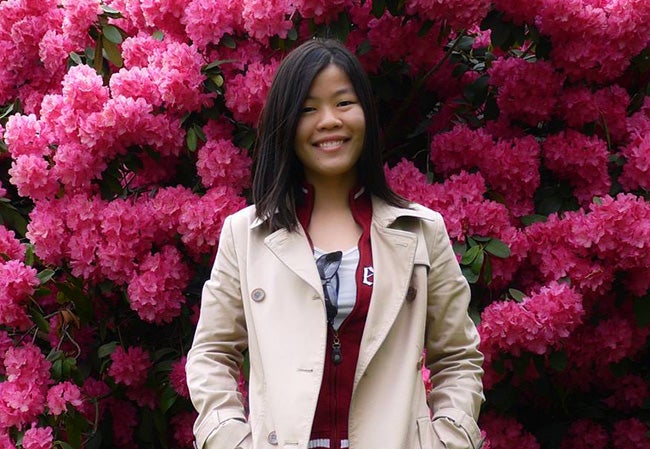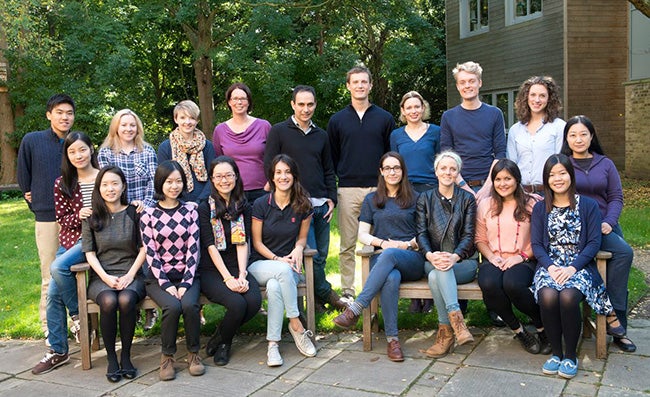~Journey from Nanyang Girl's High School and Hwa Chong institution (College) to University Oxford~
Springでは、日本や海外の大学で学ぶシンガポール人学生に、日本で学ぶことの魅力や日本への興味についてお話を聞きました。
シリーズ第2回目は、教育省語学センター(Ministry ofEducation Language Centre, MOELC)※で6年間日本語を学んだ後、現在は英国オクスフォード大学教育学部修士課程で日本語をテーマに応用言語学と第二言語の習得について研究しているシャウティンさんです。
※シンガポールでは、小学校卒業試験(PSLE)で上位10%の優秀な成績を収めた生徒が、中学入学後にMOELCで、日本語などの第三言語を学ぶことができます。
Name: Hoong Shao Ting
 Name: Hoong Shao Ting
Name: Hoong Shao Ting"I didn't have a passion when I started studying Japanese, but my two-week stay in Japan spurred a genuine interest. Now, my Master's degree research focuses on Japanese, and it is fascinating!"
Currently studying at: Department of Education, University of Oxford
(MSc Applied Linguistics and Second Language Acquisition)
- Secondary School: Nanyang Girls' High School
- Junior College: Hwa Chong Institution (College)
- Bachelor's Degree: BA Linguistics (Hons), University College London
Q. Please tell us briefly about your history of studying Japanese.
I started studying Japanese as a third language at MOELC in Secondary 1 and was determined to see it through all the way no matter how challenging it would become. I ended up choosing H2 Japanese as one of my A Level subjects in JC and completed 6 years of formal education in the language. During the 2nd year in my undergraduate studies, I managed to register for a module at an affliated university on Japanese Linguistics in Syntax (grammar) and Semantics (meaning) - I enjoyed it so much that I went back to sit in on the lectures during the second term outside of my regular timetable!
Currently, I am working on my Masters dissertation on the acquisition of Rendaku (e.g. Sakura → Yo-Zakura) by Second Language Learners ofJapanese.
Q. Why did you choose to learn Japanese?
Initially, I chose Japanese over French and German as a third language as I felt that it was more relevant and familiar, having grown up watching Japanese anime on TV, though I was not passionate about it when I started. However, I was fortunate enough to have taken part in an exchange programme with a host family in Sapporo, Hokkaido in 2008 where I stayed for 2 weeks. The experience I had with my host family spurred a genuine interest for the language and we still keep in contact 9 years on! A month-long language and cultural programme hosted by the Japan Foundation in Osaka in April 2012 sealed my passion for the language and Japan itself, when I got to experience residing in the country during the Sakura season and explored the area thoroughly with my peers from other ASEAN countries.
Q: What was the most difficult part ofstudying Japanese language?
For me, the most difficult part was acquiring a native-like accent. I had no problems with pronunciations of words, learning vocabulary or grammar, but was somehow less sensitive to accents. I took part in the Japanese Speech Contest held by the Japanese Association several times and always had to have my Japanese teacher coach me on where to use high and low-pitched tones. This was probably partly due to the lack of opportunities for oral production in language classes in comparison with reading, listening and writing.
Q: Can you share with us your image of Japan, Japanese universities and their students?
The first things that come to mind about Japan are Sakura, Nature and Detail (all of which I love!). As for my impression of Japanese university and its students, the word is "Discipline" - in the good way. I imagine asystematic and thorough education system where students are pushed to achieve the best that they can.
 My current coursemates and I, at the start of our course in Oxford.
My current coursemates and I, at the start of our course in Oxford.Q: Do you ever consider studying in Japanese universities?
I have thought about it countless times. Studying in Japan would definitely offer a more regional perspective in comparison with my education in the UK. Furthermore, I would be able to satisfy my not-so-secret desire of seeing the changing seasonal landscapes throughout the year!
However, I decided to do Linguistics in the UK as I realised that the field in Japan was kind of isolated from the international community since most of its publications were in Japanese. While the field is opening up with more Japanese academics publishing in international journals, I still find this a pity but understand that it will take time.
Q: What is your future dream?
I hope to delve further into language research and contribute to the language landscape back in Singapore - I wish to help people realise the value of learning new languages while understanding the need to protect and maintain the languages they already speak. My ideal job involves doing research and teaching Linguistics as an academic in university. My experience studying Japanese has taught me the intricacies of Language in general and allowed me to understand the perspective of a language learner. Hopefully, my research will one day benefit language learners such as my juniors at MOELC!









_Nov.jpg?optimize&width=320)


.jpg?optimize&width=320)







.jpg?optimize&width=360)


.gif?optimize&width=360)

